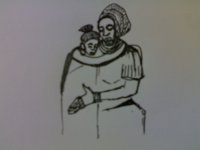February, 2012

Intal tessum hamtu, hadit kof wot qaba. (Orma)
Iwapo msichana akae uchi, ni mamaye ndiye humfunika uchi ya paja lake. (Swahili)
Quand une fille s’assoit mal, c’est sa mère qui couvre ses cuisses. (French)
If a girl sits badly, it is up to her mother to cover her thighs. (English)
Background, Explanation, Meaning and Everyday Use
The Orma people are a Cushitic pastoralist and semi nomadic ethnic group living in Kenya. They migrated from Ethiopia to Kenya spreading gradually to the area north of Mt. Kenya and down the Tana River to the coast. These were cattle and camel herders who raided more settled peoples as they migrated or ranged through various territories. In Kenya they are found at the south in Tana River and Lamu districts especially at Hola (the capital of Tana River District), Garsen, Tarasaa and Witu. The Orma population was estimated at 69,000 Kenya in 2006.
The Orma Ethnic Group in Kenya, like Africans in general, like children. Traditionally it is understood that mothers educate girls while fathers educate boys in the family. Thus the female children are usually closer to their mother. But they can also make a mistake that the mother has to correct. Girls especially are requested to cover their legs while seated. But it can be found that the girl is not seating according to the posture required to her. The mother can correct the girl after that, but the immediate action to make is to save the girl’s dignity by helping to seat properly without exposing her legs. Instructions and teaching can follow when the mother has already prevented the girl from shame. This is what is required not only for seating but for everything that can harm or bring shame to children. The immediate action will be to assist, then to instruct. Parents are there for wellbeing of their children and to protect them.
Biblical Parallels
The Bible also speaks about the responsibility of parents to teach their children and also to protect them. The following three biblical passages speak by themselves:
Ephesians 6:4: “Fathers, do not provoke your children to anger, but bring them up in the discipline and instruction of the Lord.”
Proverbs 23:13-14: “Do not withhold discipline from a child; if you strike him with a rod, he will not die. If you strike him with the rod, you will save his soul from Shell.”
Deuteronomy 6:4-9: “Hear, O Israel: The LORD our God, the LORD is one. You shall love the LORD your God with all your heart and with all your soul and with all your might. And these words that I command you today shall be on your heart. You shall teach them diligently to your children, and shall talk of them when you sit in your house, and when you walk by the way, and when you lie down, and when you rise. You shall bind them as a sign on your hand, and they shall be as frontlets between your eyes. You shall write them on the doorposts of your house and on your gates.”
Contemporary Use and Religious Application
This proverb encourages parents to take seriously their responsibility in raising their children and supporting them. Their role is to educate them and to help them become mature and independent. This includes guidance and discipline. But in some circumstances children may make mistakes and may just need relief and immediate support. The parent will need to consider these cases and just help the child. Thus the parents are there to not only guide the child, but also support him or her. This is important in our contemporary African society where family values can get lost.
NOTE: This proverb is No. 32 in Wisdom from Orma Proverbs by Dr. Calvin C. Katabarwa and Angelique Chelo. A posthumous work in collaboration with the African Proverbs Working Group. Nairobi, Kenya: Privately Printed. February, 2012. This is one booklet in the series of Endangered African Proverbs Collections. It is posted as an eBook on our website at: http://afriprov.org/index.php/resources/e-books.html
Angelique Cyamanzi Chelo
P.O Box 61591-00200
Nairobi Kenya
Tel.: (+254) – 712066589
Email: angelcheylo@yahoo.com
http://calvinnectar.blogspot.com/
Ricardo Benjamin
P.O Box 61591-00200
Nairobi, Kenya
Tel.: (+254) – 701606346
Email: ricardo.benon@gmail.com
http://about.me/ricardobenon
http://ricardobenonpoems.blogspot.com/
http://ricardobenonadverts.kbo.co.ke/home
Cephas Yao Agbemenu
Department of Fine Arts
Kenyatta University
P.O. Box 43844
Nairobi, Kenya
Cellphone: 254-723-307-992
Email: cyagbemenu@yahoo.com

